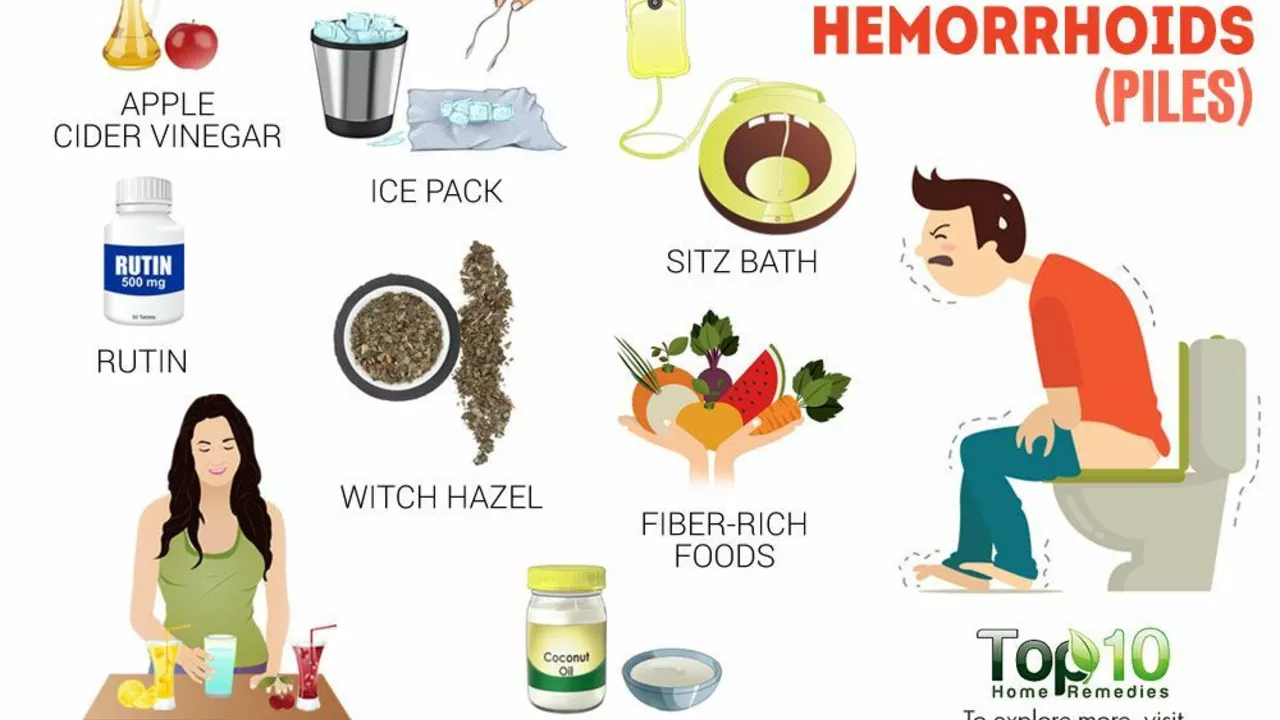Hemorrhoid self-care: quick, practical steps to feel better
Got painful or bleeding hemorrhoids? You can often ease symptoms at home with simple steps that reduce pain, speed healing, and stop things from getting worse. Start with what you can control: bowel habits, hygiene, and short-term treatments.
Daily habits that make a big difference
Soften the stool — aim for 25 to 30 grams of fiber a day from fruits, veggies, oats, or a powder supplement. Drink plenty of water, roughly two liters daily unless your doctor says otherwise. Go when you need to; don’t delay and don’t strain. Limit time on the toilet and skip prolonged reading or phone scrolling while sitting. Add gentle exercise like walking every day to help bowel regularity and lower pressure on the rectal veins.
Clean gently after bowel movements. Use plain water, a squeeze bottle, or unscented wet wipes labeled for sensitive skin. Avoid harsh soaps and rubbing — pat dry instead. Wear breathable cotton underwear and avoid tight clothing that traps moisture.
Targeted home treatments
Sitz baths are simple and effective: sit in warm (not hot) water for 10 to 15 minutes, two to three times daily and after bowel movements. Cold packs applied for 10 minutes can reduce swelling and numb pain for short periods. Over-the-counter options like witch hazel pads or topical 1% hydrocortisone can relieve itching and inflammation; use hydrocortisone only short-term and follow package directions.
If constipation is the trigger, a short course of an osmotic laxative like polyethylene glycol or a stool softener such as docusate can help. Follow the label and check with a pharmacist if you take other meds. For severe pain, acetaminophen or ibuprofen can help, but avoid heavy or long-term use without medical advice.
When a hemorrhoid thromboses (sudden, very painful lump), cold, rest, and pain relief are first-line at home. If pain is intense or symptoms don’t improve in a few days, see a clinician — they may offer clot removal or other procedures that speed relief.
Watch for warning signs: heavy bleeding, faintness, fever, or symptoms that last longer than two weeks. These need medical evaluation. Also see a doctor if you notice changes in bowel habits or unexplained weight loss.
Prevention matters: keep fiber and water consistent, move regularly, manage weight, and avoid lifting heavy objects without bracing the core. If hemorrhoids keep coming back, talk to your provider about office treatments like rubber band ligation or infrared coagulation, which are low-risk and often effective.
Hemorrhoid self-care is about steady small changes more than one dramatic fix. Try a combination of fiber, fluids, gentle hygiene, sitz baths, and short-term topical relief. If home care doesn’t cut it, don’t wait — get a checkup and tailored treatment.
Small tools help. Use a soft donut cushion for long drives or desk jobs. Avoid spicy foods if they aggravate symptoms. Track what triggers flare-ups — certain foods or stress — and adjust. Keep follow-up with your doctor if symptoms change or if you start taking new medications that affect bowels.
Hemorrhoid Self-Care: Tips for Managing Symptoms at Home

Managing hemorrhoids at home can be quite a task, but there are a few self-care tips that can help alleviate the symptoms. Simple lifestyle changes like drinking plenty of fluids and adding more fiber to your diet can prevent constipation - a major cause of hemorrhoids. Regular exercise also promotes bowel movements. Using over-the-counter creams or pads containing witch hazel can offer temporary relief. Remember, if symptoms persist, it's always best to consult with a medical professional.
